Nelson Mandela
Who_is_Nelson_Mandela
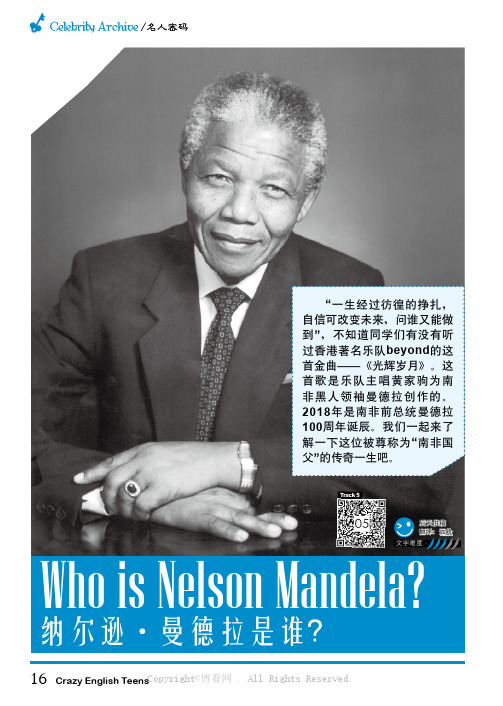
后天供稿翻译:远航文字难度·Who is Nelson Mandela?纳尔逊·曼德拉是谁?Track 51) endure [In5djuE ] v. 忍受2) dignity [5dI^nItI ] n. 尊严3) treat [tri:t ] v. 对待4) subject [5sQbdVIkt ] n. 经受者,对象5) racism [5reIsIzEm ] n. 种族主义6) vote [vEJt ] n. 投票权7) property [5pr ɒpEtI ] n. 财产8) capture [5kAptFE ] v. 抓捕9) imprison [Im5prIzn ] v. 监禁10) disharmony [5dIs5hB:mEnI ] n. 不和谐11) release [rI5li:s ] n. 释放12) violence [5vaIElEns ] n. 暴力13) charity [5tFArItI ] n. 慈善Nelson Mandela was born in July 1918. He is SouthAfrica’s first black President (1994~1999) and a braveman who 1)endured 27 years in prison with 2)dignity .Nelson’s parents couldn’t read or write, and he wasthe first in his family to attend school at age seven. Hisfather died when he was about nine, and he was sentto live with Jongintaba, the king of the Thembu, hispeople, and 3)treated as their son.Nelson went to University at Fort Hare and later theUniversity of Witwatersrand. He made many friends ofall colours and nationalities, but was the 4)subject of5)racism . Nelson became increasingly politically active,joining the African National Congress (the ANC) in1944 and helping to form the ANC Youth League. Atthe time in South Africa there were many things that theblacks were not allowed to do, including 6)vote and own7)property , and the ANC wanted to change that. Thispolicy was called “apartheid ” and the African NationalCongress was anti-apartheid.In 1962 Nelson was 8)captured and 9)imprisonedfor five years for encouraging the country to strike; thefollowing year he was charged with trying to overthrowthe government, and sentenced to life imprisonment.Nelson spent his many hard years in prisonstudying when he could and keeping in touch with theever-increasing 10)disharmony in South Africa, whichthreatened to break out into civil war. All over the worldpeople began to campaign for his 11)release . In 1990South Africa’s President de Klerk met Nelson andarranged for him to be released.After his release, Nelson and de Klerk workedtogether to end 12)violence in the country and restoreorder, and Nelson was elected President in 1994,serving for one term.After his presidency, Nelson Mandela focused on13)charity , setting up the Nelson Mandela Children’sFund and Nelson Mandela Foundation to fight povertyand HIV/AIDS. He won the Nobel Peace Prize (in 1993)and the US Presidential Medal of Freedom.纳尔逊·曼德拉出生于1918年7月。
Nelson Mandela
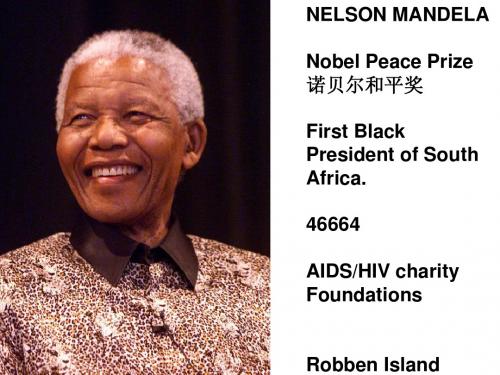
• Cape Town • When you are there, see the famous Table Mountain and eat delicious food. Cape Town is _____ _____ Robben Island Nelson Mandela _____. close to _______ to _____ in prison there. used be
NELSON MANDELA Nobel Peace Prize 诺贝尔和平奖 First Black President of South Africa. 46664 AIDS/HIV charity Foundations
Robben Island
Nelson Mandela
纳尔逊·罗利赫拉赫拉·曼德拉(Nelson Rolihlahla Mandela)是享誉全球的诺 贝尔和平奖得主。为了推翻南非白人种 族主义统治,他进行了长达50年 (1944—1994年)艰苦卓绝的斗争,铁 窗面壁28年(1962—1990年)。最终, 从阶下囚一跃成为南非第一任黑人总统, 为新南非开创了一个民主统一的局面。 南非终身名誉总统:纳尔逊·罗利赫 拉赫拉·曼德拉( Nelson Rolihlahla Mandela )(1918-)
• Port Elizabeth also has beautiful beaches. This for city is famous ________its gardens and parks _______ _______many interesting plants and which contain flowers. You can see plenty _____ birds there. of
曼德拉的一生英语短作文
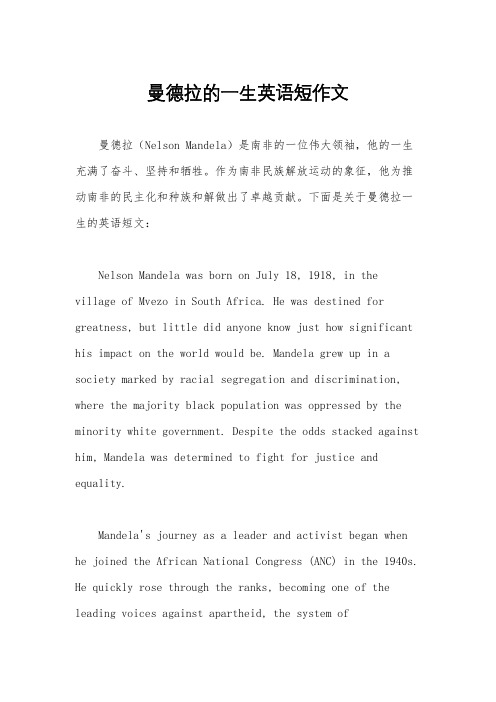
曼德拉的一生英语短作文曼德拉(Nelson Mandela)是南非的一位伟大领袖,他的一生充满了奋斗、坚持和牺牲。
作为南非民族解放运动的象征,他为推动南非的民主化和种族和解做出了卓越贡献。
下面是关于曼德拉一生的英语短文:Nelson Mandela was born on July 18, 1918, in thevillage of Mvezo in South Africa. He was destined for greatness, but little did anyone know just how significant his impact on the world would be. Mandela grew up in a society marked by racial segregation and discrimination, where the majority black population was oppressed by the minority white government. Despite the odds stacked against him, Mandela was determined to fight for justice and equality.Mandela's journey as a leader and activist began when he joined the African National Congress (ANC) in the 1940s. He quickly rose through the ranks, becoming one of the leading voices against apartheid, the system ofinstitutionalized racial segregation enforced by the South African government. Mandela's activism landed him in hot water with the authorities, and he was arrested multiple times for his political activities.In 1964, Mandela was sentenced to life in prison forhis involvement in anti-apartheid activities. He spent the next 27 years behind bars, enduring harsh conditions and separation from his family. Despite the hardships, Mandela remained steadfast in his commitment to the cause of freedom. His imprisonment only served to galvanize support for the anti-apartheid movement both within South Africaand around the world.Finally, in 1990, Mandela was released from prison, signaling the beginning of a new era for South Africa. He wasted no time in working towards reconciliation and democracy, leading negotiations with the government to dismantle apartheid and establish free and fair elections. Mandela's efforts culminated in the historic 1994 elections, in which he was elected as South Africa's first black president.As president, Mandela faced the daunting task of leading a deeply divided nation towards unity and reconciliation. He embraced the concept of forgiveness, famously declaring, "Courageous people do not fear forgiving, for the sake of peace." Mandela workedtirelessly to bridge the gap between black and white South Africans, promoting policies of inclusivity and equality.Mandela's presidency was marked by significant progress in areas such as healthcare, education, and social welfare. He also played a key role in promoting peace and stability across the African continent, earning him widespread admiration and respect both at home and abroad. Despite stepping down as president in 1999, Mandela continued to be a global advocate for human rights and social justice until his passing in 2013.In conclusion, Nelson Mandela's life serves as a testament to the power of perseverance, courage, and forgiveness. From his humble beginnings in rural South Africa to his historic presidency, Mandela remained true tohis principles and never wavered in his commitment to justice and equality. His legacy continues to inspire people around the world to strive for a better, more just society.。
高中英语必修一Unit 5 Reading(人教版)全面版
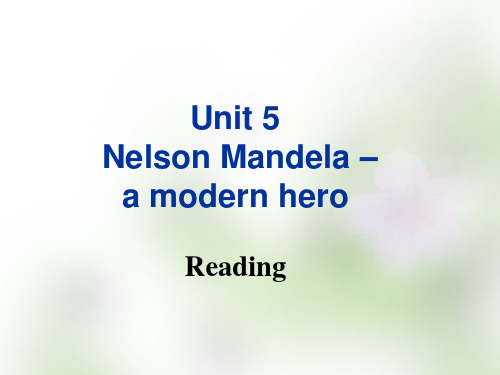
Paragraph 1:
1. How old was Elias when he first met Mandela? He was twelve.
2. What was Mandela at that time? He was a lawyer.
3.What did Mandela do to help black people?
Paragraph 4:
What was the situation of black people at that time?
3. Why didn’t Elias have a passbook? Because he wasn’t born there.
Paragraph 3:
How did Mandela help Elias?
Mandela told Elias how to get the correct papers so he could stay in Johannesburg.
Fast reading
How many parts can the text be divided into? Give the general idea of each part. Part 1 (para 1-2)
The life of Elias before he met Nelson Mandela.
vt. & vi. 投票; 选举 n. 投票; 选票; 表决 vt. 进攻; 攻击; 抨击 n. 暴力; 暴行 adj. 相等的; 平等的 adj. 反黑人的 vt. 判决;宣判 n. 民主主义;国家主义 n. 生计;谋生
Expressions Preview
1. 乐意做某事
nelson mandela关于语言的名言

nelson mandela关于语言的名言1. "If you talk to a man in a language he understands, that goes to his head. If you talk to him in his own language, that goes to his heart."2. "Language is not just a means of communication, it is the essence of our being."3. "Language is the key that unlocks the door to understanding different cultures and perspectives."4. "Language is the bridge that connects people of different backgrounds and enables them to work together towards a common goal."5. "We should celebrate and embrace linguistic diversity, as it enriches our society and promotes tolerance and understanding."6. "Language has the power to build bridges, break down barriers, and inspire change."7. "By learning someone's language, we not only gain access to their thoughts but also gain a deeper understanding of their soul."8. "Language is a tool of empowerment, enabling individuals to express themselves and advocate for their rights."9. "Language is a powerful weapon against oppression, as it gives a voice to the voiceless."10. "When we communicate in someone's native language, weshow respect and appreciation for their culture and heritage." 11. "Language embodies the spirit of a nation and serves as a symbol of its identity."12. "Through language, we preserve our history and pass on our traditions to future generations."13. "Language connects us to our roots and reminds us of where we came from."14. "In a multilingual society, understanding and accepting different languages is crucial for social cohesion and unity."15. "Language has the power to heal wounds and reconcile divided communities."16. "By embracing multiple languages, we enrich our minds and expand our horizons."17. "Language is a reflection of our thoughts, and through it, we can shape a better world."18. "The ability to learn and speak another person's language is a gesture of goodwill and promotes global friendship."19. "Language is the melody of the soul, and when we understand each other's melodies, harmony emerges."20. "Through language, we express our aspirations and hopes for a better future."21. "Language is the thread that weaves the fabric of humanitytogether."22. "Speaking someone's language is not just about words; it's about understanding their experience and perspective."23. "Language is the foundation of education and the key to unlocking opportunities for future generations."24. "Linguistic diversity is a treasure that should be cherished and protected."25. "Through language, we break down the walls of ignorance and build bridges of understanding."26. "Language is the lens through which we view the world, and by understanding different languages, our perspective becomes broader."27. "Language connects us to our ancestors and future generations, creating a sense of continuity and belonging."28. "The richness of a culture can be felt through its language, art, and traditions."29. "By learning someone's language, we open doors to meaningful connections and mutual respect."30. "Language promotes empathy and understanding, helping us to walk in someone else's shoes."31. "Through language, we express our deepest emotions and connect with others on a profound level."32. "Language is a gift that allows us to share our stories, dreams, and struggles with others."33. "When we speak someone's language, we show them that they matter and their voice is heard."34. "By preserving endangered languages, we preserve the diversity and richness of the human experience."35. "Language is a tool for peacebuilding and reconciliation, as it helps us to see the common humanity in all people."36. "Language is the foundation of a strong society, where individuals can freely express themselves and engage in meaningful dialogue."37. "Through language, we build bridges of understanding and dismantle the walls of prejudice and discrimination."38. "Language allows us to celebrate our differences and find common ground amidst diversity."39. "Speaking someone's language is an act of love and respect, fostering a sense of belonging and acceptance."40. "Language has the power to inspire generations and ignite movements for social change."41. "By valuing and promoting native languages, we protect and honor the cultural heritage of indigenous communities."42. "Language connects us to our ancestors, enabling us toappreciate their wisdom and learn from their experiences."43. "Through language, we can amplify marginalized voices and advocate for social justice."44. "Language is a vibrant tapestry that tells the story of our shared humanity."45. "Linguistic diversity is a treasure that enriches us all and strengthens the fabric of society."46. "Language is the key that unlocks the doors of understanding between cultures."47. "By speaking someone's language, we show them that their culture is valued and respected."48. "Language is the vehicle through which we share knowledge and ideas, propelling progress and innovation."49. "Linguistic diversity is a reflection of the diversity of human thought and expression."50. "Language is a bridge that allows us to connect with people across borders and build international friendships."51. "Through language, we can challenge prejudices and promote social inclusivity."52. "Linguistic diversity is an asset that should be celebrated and utilized to foster creativity and innovation."53. "Language is a tool for diplomacy, enabling effectivecommunication and dialogue between nations."54. "By embracing linguistic diversity, we create a more inclusive and equitable society."55. "Language is the foundation of a strong and vibrant culture."56. "Through language, we can preserve and share the knowledge and wisdom of our ancestors."57. "Language is the key to understanding different perspectives and fostering empathy."58. "By learning someone's language, we open doors to economic opportunities and cross-cultural collaboration."59. "Language is a powerful force for change and social transformation."60. "Through language, we honor and respect the experiences and contributions of all people."。
Unit 5 Nelson Mandela
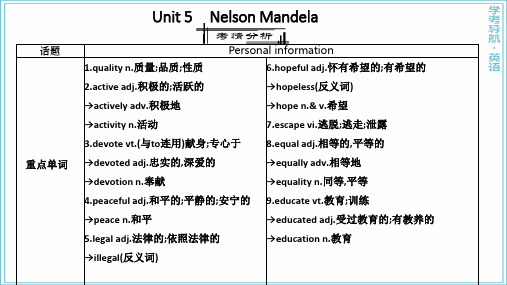
→peace n.和平
5.legal adj.法律的;依照法律的 →illegal(反义词)
→educated adj.受过教育的;有教养的
→education n.教育
10.relative n.亲戚;亲属 →relation n.关系
→terrorism n.恐怖主义 →terrorist n.恐怖分子
2.They’ll never forget July 1 when Hong Kong returned to its motherland.
3.There are many reasons why people like traveling.
征求意见:
What do you think of...? What’s your opinion?
12.be active in sth. 积极从事某事
1.The last thirty years have seen the greatest number of laws stopping our rights and progress,until today we have reached a stage where we have almost no rights at all.
【即时巩固】 单项选择 (1)—How did your father deal with you? B being punished. —We were lucky to A.admit B.escape C.consider D.stop (2)Mark often attempts to escape B whenever he breaks traffic regulations. A.having been fined B.being fined C.to have been fined D.to be fined 考点5 equal vt. 抵得上 adj. 相等的;胜任的 n. 同等/相等的人或物 【例句研读】 (1)He equals me in strength but not in intelligence.他和我力气 相当 ,但智力不同。 (2)Are men equal to women in physical strength?在体力上男人和女人 相同 吗? (3)She did not feel equal to receiving visitors.她觉得自己 不适合 接待来客。 无与伦比 (4)Yao Ming is a basketball player without equal in China.在中国,姚明是个_________ 的篮球运动员。
人教版高中英语必修1Unit 5 Nelson Mandela reading
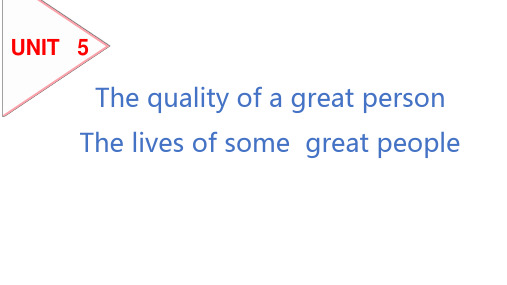
例句: 1. As soon as he got inside, the dog shook himself. 他一进来,狗就开始摇头摆尾。 2. They stopped you as soon as you deviated from the script. 一旦你偏离了剧本的内容,他们就会喊停。 3. As soon as the two chicks hatch, they leave the nest burrow. 两只小鸟一出壳就离开了巢穴。 4. As soon as we were inside, the rain began to bucket down. 我们刚进屋,大雨便倾盆而下。 5. As soon as relations improve they will be allowed to go. 一旦关系有所改善,他们就可以获准离开。
She wanted to continue working after she was married.
她想结婚后继续工作。
拓展练习
He was generous with his time, ________ I was grateful for. A.which B.that C.as D.不填
Be generous with your praise. Point out the specifics of their personality and behaviour that add value.
大胆的赞赏他们。大方的对待称攒,指出他们的性格 特征和行为价值。
In a nutshell, be generous with the information you do possess, but also be aware and open about the things that you do not know.
曼德拉人物介绍英语作文

Nelson Mandela,a name synonymous with resilience,leadership,and the indomitable spirit of freedom,was born on July18,1918,in the village of Qunu,located in the Eastern Cape of South Africa.His life was a testament to the power of perseverance and the unyielding quest for justice and equality.Mandelas early life was steeped in the traditions of the Thembu tribe, which instilled in him a sense of dignity and respect for community.His father,Gadla Henry Mphakanyiswa,was a chief,and his mother,Nosekeni Fanny,was a daughter of a chief,both of whom recognized the potential in young Mandela.They sent him to a Methodist mission school,where he was given the name Nelson,and later to Clarkebury Boarding Institute and the University of Fort Hare.Mandelas political awakening began during his university years,where he became involved in the African National Congress ANC,a movement that would define his lifes work.He was expelled from the university for his involvement in a student protest,but this setback did not deter him. Instead,it fueled his commitment to the cause of ending racial segregation and inequality in South Africa.In the1940s and1950s,Mandela emerged as a prominent figure in the antiapartheid movement.He cofounded the ANC Youth League and later became a leader within the organization.His charisma and eloquence made him a powerful orator,inspiring countless South Africans to join the struggle for freedom.Mandelas commitment to nonviolent resistance was evident in his early activism.However,as the governments oppressive tactics escalated,so too did the methods of the resistance.In1961,Mandela cofounded Umkhonto we Sizwe,the armed wing of the ANC,which engaged in acts of sabotage against the apartheid regime.This marked a significant shift in his approach to the struggle,one that would ultimately lead to his arrest and imprisonment.On August5,1962,Mandela was arrested and charged with inciting workers to strike and leaving the country without a passport.He was sentenced to five years in prison.However,his legal troubles were far from over.In1963,he was brought to trial again,this time for sabotage and conspiracy to overthrow the government.The Rivonia Trial,as it came to be known,was a turning point in Mandelas life and the antiapartheid movement.During his27year imprisonment,Mandela became a global symbol of the fight against injustice.His unwavering spirit and steadfast belief in the cause inspired people around the world.While in prison,he continued to study and educate himself,preparing for the day he would once again walk free.In1990,after years of international pressure and protests,the South African government finally released Mandela.His release was met with jubilant celebrations and a renewed sense of hope for the future.Mandelas first public speech upon his release encapsulated his vision for a democratic and inclusive South Africa:I stand here before you not as aprophet but as a humble servant of you,the people.The following years were marked by intense negotiations between the ANC and the South African government,culminating in the countrys first democratic elections in1994.Mandela,now the leader of the ANC,was elected as the first black president of South Africa,a historic moment that signified the end of the apartheid era.Mandelas presidency was characterized by his efforts to foster reconciliation and unity among South Africas diverse population.The Truth and Reconciliation Commission,established under his leadership,was a groundbreaking initiative aimed at addressing the atrocities of the past and promoting healing and forgiveness.Beyond his political achievements,Mandelas legacy is also defined by his humanitarian work.He established the Nelson Mandela Foundation,which focuses on promoting freedom,equality,and social justice.His tireless efforts to improve the lives of the disadvantaged,particularly children, earned him the Nobel Peace Prize in1993,alongside then South African President F.W.de Klerk.Mandelas life was not without its challenges and controversies,but his unwavering commitment to justice and equality has left an indelible mark on history.His passing on December5,2013,was mourned by millions around the world,but his spirit and message of hope continue to inspire generations.In conclusion,Nelson Mandela was a beacon of hope and a symbol of the human capacity for resilience and transformation.His life serves as a reminder that even in the face of seemingly insurmountable odds,one person can make a difference and change the course of history.As we reflect on his legacy,we are reminded of the power of perseverance,the importance of standing up for what is right,and the enduring impact of a life dedicated to the pursuit of freedom and justice.。
- 1、下载文档前请自行甄别文档内容的完整性,平台不提供额外的编辑、内容补充、找答案等附加服务。
- 2、"仅部分预览"的文档,不可在线预览部分如存在完整性等问题,可反馈申请退款(可完整预览的文档不适用该条件!)。
- 3、如文档侵犯您的权益,请联系客服反馈,我们会尽快为您处理(人工客服工作时间:9:00-18:30)。
4. What dream did Nelson Mandela have? C A. To become the president of South Africa. B. To win the Nobel Peace Prize. C. To make black and white people equal. D. To blow up some government buildings.
2. Nelson Mandela opened a black
law firm in order to ____. B
A. make money
B. help the poor black people
with their problems
C. make himself famous D. study law
Choose the best answer.
1. Why did Elias have to leave school? C A. He didn't have a passbook. B. His home was far from the school. C. His family couldn't afford the school fees. D. He couldn't read or write.
more traffic accidents. The city has seen many changes.
Difficult sentences analysis We have reached a stage where we have almost no rights at all.
我们到了一个完全没有权利的阶段。
The text can be divided Into two parts. Give the general idea of each part. Part 1 (para 1-2) The life of Elias before he met Nelson Mandela. Part 2 (para 3-5) The change of Elias’ life after he met Nelson Mandela and what Mandela did.
Mandela’s help
Mandela told him how to get ____________ the correct papers so that he could keep his job.
support for Mandela
the ANC He joined ____________ _____________. Youth League He helped Mandela blow up _______ some government buildings.
Summary
Elias’ life before meeting Mandela Information of Elias
Elias’ problem He was a poor ________ black worker. He needed to get a passbook _________ because he wanted to continue doing his work.
★ Homework
Writing What good qualities should
we learn from great men,for example,Mandela? Give some facts.Rewrite Elias’ story. Finding Find the sentences with attributive clauses and put them into Chinese.
True or False
1. Elias went to see Nelson Mandela
when he was in trouble. T
2. Elias left school because the school
was too far from his home. F 3. Nelson Mandela helped him keep his job. T 4. Elias met Nelson Mandela at school. F
5. Why did Elias support Nelson Mandela? Mandela told him how to get the correct _________ papers so that he could keep his job. 6. How did he support Mandela? He joined _______________________. the ANC Youth League blow up He helped Mandela __________ some government buildings.
The life of Elias
time events 1940 he was born 1946 he began school 1948 he left school 1952 he went to Mandela for advice 1963 he helped Mandela blow up some government buildings
3. Why did Elias help Nelson Mandela blow up some government buildings? C A. Hedangerous.
C. It was a way to make black and white people equal. D. He wanted to be famous.
According to the text, what was the
situation for black people in South Africa? Black people had no _____. vote They couldn’t get _____ they wanted. jobs They were sent to the _______ areas poorest where no one could grow food. ______
5. Nelson helped him keep his job. T
6. Elias was unable to read or write because he was lazy. F 7. Nelson was a black lawyer. T 8. Nelson thought violence was a good way to help black people. F
guidance, fee, out of work, hopeful, as a matter of fact, equal
4. All people are _______, so they should equal share the same rights as each other. 5. I am _________ that she will come hopeful tomorrow. 6. He did the work with his teacher's guidance ___________.
2. He has been _____________ for a year and out of work
now he’s looking for a job.
3. The worker looks stupid, but
as a matter of fact _________________, he is bright.
ELIAS’ STORY
Pre-reading: Make a guess What’s the connection between them?
Elias
A. Strangers
B. Friends
C. Father and son
D. Teacher
and student
Elias’ Story
Black people’s problems
They had no ______. vote They couldn't get ______ they wanted. jobs They had to live in _________________. the poorest areas
Elias’ life after meeting Mandela
S. P. O.
Att C.
Discussion:
What can we learn from the text about Nelson Mandela?
Helpfulness Bravery (勇敢) Persistence (坚持不懈) Kindness (亲切, 仁慈) Determination (坚定) ……
Elias: a poor black worker in South Africa. The text tells us about his life and what he did with Nelson Mandela to fight for black people.
Fast reading
Fill in the blanks with the correct words
guidance, fee, out of work, hopeful, as a matter of fact, equal
1. His lawyer’s hourly ______ is 150 dollars. fee
